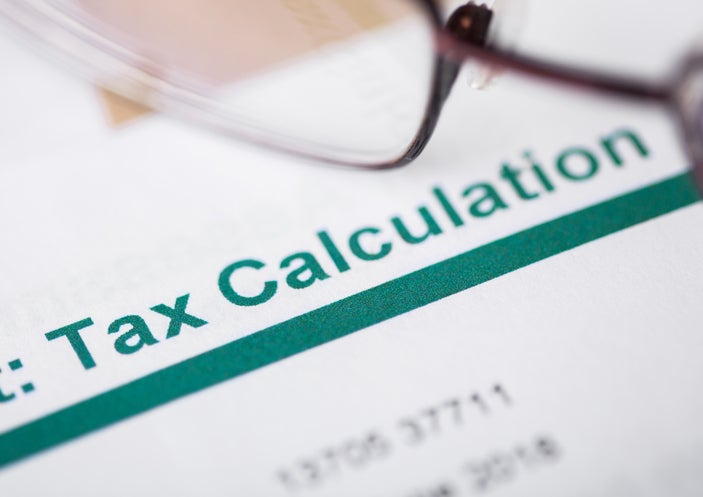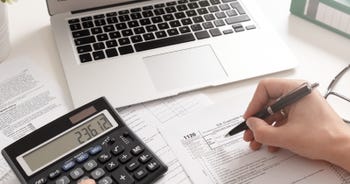What are super-deductions and how can they benefit my small business?
Whether you set your company up in the pandemic or you’ve been trading long before, there’s no doubt that Covid-19 had a big impact on the way we run our businesses.
The super-deductions allowance was one of the tax-relief systems set up by the Government to help businesses get back on their feet following the pandemic. And, our handy guide is here to help walk you through everything you need to know and more about super-deductions and how they can benefit your business.

What are capital allowances?
Capital allowances let businesses write off the cost of certain capital assets against their taxable income.
You’ll have to prove that any capital allowance is necessary for your business and that the item has ongoing benefits for the business that will last longer than a year. For example, you could buy a piece of equipment for £10,000 and expect this to last for 10 years.
What is the super-deduction?
From 1st April 2021 until 31st March 2023, any investment that your business makes in qualifying plant and machinery will benefit from a 130% capital allowance deduction. It also offers 50% of the first-year allowance for qualifying special rate assets.
This upfront super-deduction will allow companies to cut their tax bill by up to 25p for every £1 invested.
How does the super-deduction work?
The super-deduction allowance is the most attractive tax incentive for business investment ever offered by the British government.
It gives businesses a much higher tax deduction in the tax year of purchase than would otherwise normally occur.
These allowances are available alongside the ongoing Annual Investment Allowance (AIA) which gives 100% relief for costs of qualifying plant and machinery in the tax year purchase.
Why did the super-deduction come into force?
Although it’s only a temporary measure, super-deductions were brought in to boost the UK’s post-pandemic recovery and champion business investment. This, in theory, should lead to more corporate profits for the government to tax in 2023. Making capital allowance more generous helps to stimulate business investment and promote economic growth.
Super-deduction in practice
It can be hard to fully understand just how super-deductions work, so here’s an example of it in practice.
A company incurring £1m of qualifying expenditure claims the super-deduction, spending its £1m on qualifying investments. This means that it can deduct £1.3m (130% of the initial investment) when calculating its taxable profits.
Deducting £1.3m from its taxable profits will save the company up to 19% — or around £247,000 — on its corporation tax bill.
Is my business eligible for the super-deduction?
The UK government website states that you can ‘only claim the super-deduction allowance if you are a company’ — this means for sole traders and partnerships, you’re out of luck.
You can claim the super-deduction allowance if:
- Your business is subject to Corporation Tax
- You incurred the expenditure on or after 1st April 2021, but before 1st April 2023
- You didn’t buy the plant and machinery due to a contract you entered into before 3rd March 2021
What assets qualify for this tax relief?
Not all business assets will qualify for the super-deduction allowance, but the groups that do can span a multitude of businesses.
Essentially, most tangible capital assets used in the course of business are considered ‘plant and machinery.’ These assets include:
- Computer equipment and servers
- Vehicles used for trading purchases including tractors, lorries and vans (excluding cars)
- Office equipment including chairs and desks
- Electric vehicle charging points
- Refrigeration units
- Ladders, drills and cranes
Are there any expenses which are excluded from claiming the super-deduction?
Yes, certain expenditures will be excluded when it comes to claiming the super-deduction.
These exclusions apply to:
- Buildings and structures (excluding integral features)
- Cars
- Expenditure that’s incurred in the chargeable period in which the qualifying activity is permanently discontinued
- Leased items
- Shares and investments
- Residential properties
There’s also no deduction available for used and second-hand assets on contracts that were entered prior to 3rd March 2021.
What are the benefits of the super-deduction?
There are three main benefits for companies that qualify for the super-deduction.
- Net tax benefit of 24.7% — For assets that qualify for the super deduction, taxable profits can be reduced by more than the cost of the asset.
- Lower corporation tax liabilities — Corporation tax liabilities will be lower as a result of the higher capital allowances that are being claimed. If a taxable loss is generated, this could be carried forward and potentially offset against future taxable profits. This means you could save tax at 25% in future years.
- Corporation tax repayment — Due to the higher rates of relief, some companies may end up with a loss for corporation tax purposes as a result of higher capital allowances being claimed. This can be carried back up to 3 years generating a corporation tax repayment for earlier accounting periods.
What happens if I sell an asset that my company has claimed on the super-deduction?
If your business sells an asset that you’ve previously claimed under the super-deduction then this could have quite the impact.
The rules of the super-deduction require that you must account for the proceeds via what is known as a ‘balancing charge’. A balancing charge may be up to 130% of the disposable value if the sale takes place in a tax year commencing before 1st April 2023. This adds to your business's taxable profits.
If this occurs, the clawback could significantly harm your cash flow if the asset is disposed of.
What does it mean when an item is ‘disposed’ of?
Essentially, a ‘disposal event’ would be when an asset is sold, it ceases to exist or the business no longer operates. In some cases, this might not be an immediate issue as the asset may last for several years.
For disposal in the accounting period ending before 1st April 2023
If you dispose of an item before the 1st April 2023, then the proceeds received for the asset are multiplied by 130%. This effectively adds this value to the company's profits, which would then be taxable at 19%.
For disposal in the accounting period that straddles 1st April 2023
The rules here are a little bit trickier as the proceeds here will again need to be multiplied but the percentage will be less than 130%. The factor will be based on the days in the accounting period which arose before 1st April 2023.
For disposal in the accounting period commencing on or after 1st April 2023
With the super-deduction relief due to end on 31st March 2023, you won’t need to adjust the proceeds with a multiplication factor after this date. The proceeds will still give rise to a balancing charge, be added to the company profits and be taxed at the new rate of 25%.
Get your business on track with Bionic
The world of tax and super-deductions can be confusing, especially when you’re a small business just trying to get by. Whether you’re wrapping your head around what happens if you dispose of an asset that previously qualified for super-deductions, or you're simply wondering if your business is eligible, our guide can help.
Get in touch today with the Bionic team to discuss your needs or get more information on business finance.








